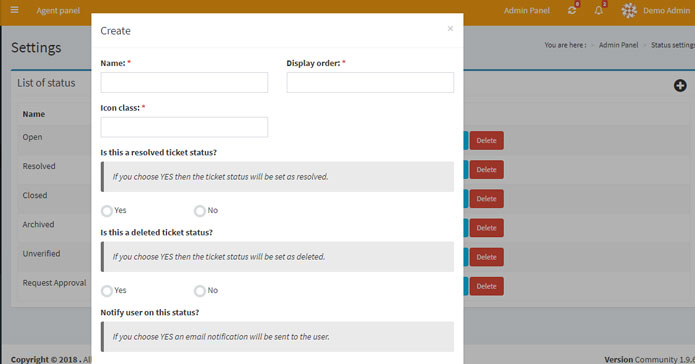-
Notifications
You must be signed in to change notification settings - Fork 566
Status
Applicable editions: Faveo Helpdesk Community and Faveo Servicedesk Community
In a ticket support landscape, it’s imperative to know the status of your ticket. This module allows you to create new status of the tickets(“Open,” “Closed,” “Resolved), edit existing ones, and decide whether email notifications should be sent to the client when his or her ticket status changes.
Go to Admin panel> Ticket > Status > Create Status

Display Order: Provide a number into the Display Order box, which shall indicate as to where the new status should apper in the order. The order list will be displayed in the Inbox page or the ticket details page under the status button. For example, enter “1” if you want the new status to appear at the top of the list or “2” if you want it to be second in the list.
Icon Class:
Is this a resolved ticket status: If Yes, then the ticket will be resolved when this particular status is selected. If it is set to No, then the ticket will not be under the resolved tickets list.
Is this a deleted ticket status: If Yes, then the ticket will be deleted when this particular status is selected. If it is set to No, then the ticket will not be under the deleted tickets list.
Notify user on this status: If you choose YES an email notification will be sent to the user.
Now click on Create Status.
Did you find it helpful? If not email us on [email protected]
Installation and Upgrade Guide
- GUI Install Wizard
- Manual Install
- CLI Install
- Server Requirements
- Installation with Apache
- Installation with cPanel
- Cron Job or any Job scheduler
- Faveo Helpdesk Installation on CentOS 7 with Apache on PHP 7.1
- Faveo Helpdesk Installation on CentOS 7 with Nginx on PHP 7.1
- Faveo Helpdesk Installation on Ubuntu 18.04 LTS with Apache on PHP 7.1
- Faveo Helpdesk Installation on Ubuntu 18.04 LTS with Nginx on PHP 7.1
- Faveo Helpdesk Installation on Debian 9 with Nginx on PHP 7.1
- Faveo Helpdesk Installation on Debian 9 with Apache on PHP 7.1
- Migrating Faveo from one server to another
- Configuration of Redis with Faveo
- Install and configure Redis, Supervisor and Worker for Faveo on Ubuntu 16.04
- Install Let’s Encrypt SSL on CentOS 7 Running Apache Web Server
- Install and configure a simple mail server for sending mails using PHP mail function in Faveo on Ubuntu 16.04 server
- Install and configure Redis, Supervisor and Worker for Faveo on Centos 7
- Install and configure a simple mail server for sending mails using PHP mail function in Faveo on Centos 7 server
- Faveo Helpdesk Pro Installation on Windows Server 2012 R2
- Install Active Directory Domain Services in Windows Server 2012 R2
- Install Faveo Helpdesk Community on Centos, Ubuntu or Debian Using Script
- Set up automatic backup for Faveo-Helpdesk
Administrator's Guide
- Faveo File Storage
- Change client side theme color
- How to edit or change the footer in faveo
- How to change agent and admin panel Faveo logo link and logo
- Agents
- Departments
- Team
- Priority
- SLA
- Workflow
- Helptopic
- Default Ticket Settings
- Status
- Rating
- Close Ticket Workflow
- Company Settings
- Social Login
- Language
- Security
- Debugging/Logs
- Ban Emails
- Widgets
Agent's Guide
Email Integration
Release & Upgrade Notes
- General Faveo Upgrade Guide Manual
- General Faveo Upgrade Guide Auto
- Upgrade guide to v1.9.2
- Upgrade guide to v1.9.0
- How to update v1.0.7.9 to v1.0.8.0
- Manual Upgrade from v1.0.7.8 to v1.0.7.9
- Faveo Release notes & upgrade guide for V1.0.7.7
- Faveo Release notes & upgrade guide for V1.0.7.5
- Faveo Release notes & upgrade guide for V1.0.7
Known Issues
- The open_basedir restriction in effect
- 404 Not Found
- 500 Internal Server Error
- Bug after update from 1.0.7.4 to 1.0.7.5 or higher version
- Syntax error, unexpected ‘var’(T_VAR), expecting ‘;’
Contribute & Feedback
- Support the community edition
- Contribution Guide
- Faveo Feedback & Customisation
- Help in language translate
Knowledge Base
Third Party Integration
Plugins
API